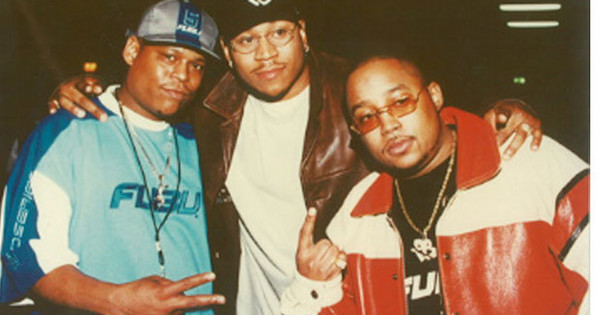From Selling Wool Hats On The Streets Of Queens…

Started from the bottom…. and now he’s investing his millions into tons of different startup companies on ABC‘s Shark Tank.
Daymond John got his start in 1989 by selling wool hats on the streets of Queens. Yes, that’s right. The man you see on that super hit reality show giving business advice to small business owners used to sell his hand-sewn hats to passersby in Queens.
He called his brand Fubu, which stands for “For Us, By Us.” Back then, Fubu was hardly a company, more so than just a really big dream. John worked out of his mother’s basement, sewing hats himself, and by 1992, he had run out of money three times trying to launch the brand.
In 1994, Daymond managed to secure $300,000 in purchase orders at the Magic industry trade show in Las Vegas for his fledgling clothing line. The growing demand created a false sense of security, and upon returning to Queens, he was turned down for a loan by 27 banks.
Although he wanted to give up, he didn’t fold the business. John took out a $125,000 mortgage on the house he and his mother shared, and along with three childhood friends, turned it into Fubu’s first clothing factory.
Then, in 1997, John took out an ad in The New York Times that read: “A million dollars in orders. Need financing,” and landed a distribution deal with Korean electronics manufacturer Samsung.
If Fubu could generate $5 million in sales within three years, the partnership would be extended.
Talk about pressure….

Fubu not only hit the $5 million mark within a year, it hit $30 million in sales
The company was gaining so much brand recognition that Fubu began licensing its name for ladies’ merchandise like handbags and boots.
By the end of 1998, the company had reached $350 million in sales, including licensing dollars.
Product was selling fast, and John and his partners began ordering double what they needed. This overestimation of future orders led to millions in excess inventory that Fubu had to turn around and sell at a steep discount.
Growing pains are not fun, but John kept going and took no shortcuts on his journey.

In 2001, John and his partners decided to produce their own hip-hop album and feature its own products in a music video.
While the compilation album featured popular artists such as LL Cool J, Ludacris, and Nas, but massive overspending on production made it impossible for Fubu recoup its investment through record sales.
The project taught John about the risk one takes when expanding into new industries, a lesson that he could later use when asked to join a reality series in 2009.
When Hollywood producer Mark Burnett offered John a spot on an American version of the Japanese reality series Dragon’s Den, he didn’t think that it would ever be anything much.
The new show, called Shark Tank, would feature contestants pitching their business ideas in the hopes of securing an investment from successful entrepreneurs.
After the first season, John was invited back for a second and third, at which point Shark Tank developed into a hit series, attracting 8 million weekly viewers.
One of the lessons John has learned from becoming a household name is that entrepreneurs everywhere now view him and the other sharks as business role models.
Considering the man went from selling wool hats on the streets of Queens to having so much money he can invest in multiple companies while starring on a hit reality show, we’d say that’s enough to make him a role model for all startup business owners.

Source
http://firstslice.com
